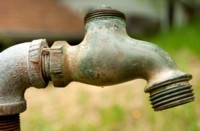New report calls for overhaul of crumbling water infrastructure
 A
A target=”_blank”>new report produced by
Green For All in Seattle, says that spending $188 billion on
green water infrastructure would generate billions more in economic
activity and create almost two million jobs nationwide.
The study, produced in partnership with the American Rivers,
Pacific Institute, and the Economic Policy Institute, sets out the
problem facing cities throughout the United States: aging
infrastructure surrounding drinking water, waste water and storm
water.
The solution, a green infrastructure program including green
roofs, urban tree planting, constructed wetlands, permeable
pavements, rainwater harvesting, and greenways. For the Pacific
Northwest, the reports estimates between 50,000 and 72,000 jobs
would be created if the recommended infrastructure work were
undertaken.
Water infrastructure is crucial to BC’s climate change
adaptation. The
target=”_blank”>IPCC Technical Paper on Climate Change and
Water says water resources will be strongly impacted by climate
change.
The BC government’s
water smart website acknowledges the threat, “Climate change is
already impacting our forests, rivers and lakes, infrastructure,
agriculture, industry, and recreational opportunities.”
Climate change is going to cause more extreme weather
conditions, which means more intense rainfall and more flooding.
Some of the report’s recommendations for improved green water
infrastructure could provide valuable guidance for even greater
action in BC.
According to the report, green infrastructure can preserve and
restore natural landscape features such as forests, floodplains and
wetlands. Benefits include reduced storm water runoff and
pollutants, enhanced groundwater recharge, increased carbon
sequestration, and improved air quality.
Source: target=”_blank”>ISIS, Sauder School of Business, UBC
Source: earthfix.opb.org

